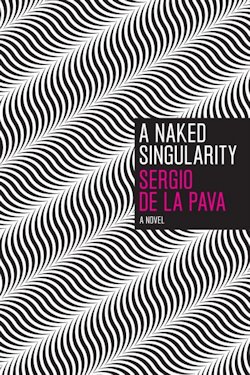Welcome back to the British Genre Fiction Focus, Tor.com’s regular round-up of book news from the United Kingdom’s thriving speculative fiction industry.
This week, we begin with a discussion of self-publishing, prompted by an article in The Guardian asking why the form is still scorned by literary awards—an article which was itself prompted, presumably, by the news that Sergio de la Pava’s novel A Naked Singularity has won a major prize, despite being self-published fully five years previously.
Then, in a bumper edition of Cover Art Corner, the third time’s the charm for two recently revealed new books—The Cormorant by Chuck Wendig and The Broken Eye by Brent Weeks—both of which mark the third volumes of their respective series.
And finally, The Chronicles of Thomas Covenant, the Unbeliever begins again… at the very moment it ends.
No Prizes for Self-Publishing
In an article for The Guardian last Friday, Liz Bury asked why self-publishing is, despite the immense success of several of its most visible figures, still scorned by literary awards.
A self-published book reaching the top of the charts is losing its power to surprise. Certainly it’s less shocking than it might have been a few years ago to learn that Violet Duke’s self-published romance novels, Falling for the Good Guy and Choosing the Right Man nabbed two spots on this week’s iBookstore bestseller chart, alongside the likes of JK Rowling and Dan Brown.
It’s safer for an editor at a mainstream publishing house to buy a book that reads a lot like last year’s bestseller, than to stick out their neck in support of an unproven concept that might not deliver. But readers have no such reason to be cautious, so buyer power is increasingly setting the agenda in mass-market publishing.
New digital bestseller lists, such as the Kindle and iBookstore charts, are helping self-published authors be seen. And then there’s EL James, whose stuff-of-dreams rise from self-published writer of fan fiction to multimillionaire bestselling author earned her pole position on Forbes’ list of the year’s highest-earning authors.
My first problem with Bury’s brief piece is with her premise, because commercial success has never necessitated critical acclaim or literary praise. Case in point: it didn’t matter a damn how many millions of copies of Harry Potter and the Philosopher’s Stone were sold, JK Rowling still wasn’t going to be nominated for a literary prize like the Booker.
Moving beyond Bury’s preamble, her point about Sergio de la Pava is more powerful. Just last week, de la Pava picked up the PEN/Robert W. Bingham award for his novel A Naked Singularity. Thing of it is, A Naked Singularity was self-published way back in 2008, and only now noticed because it was picked up by a “proper” publisher.
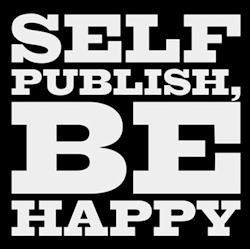
Problematic, perhaps, but I sympathise with the circumstances leading to this so-called snubbing. I’m far from the world’s most popular blogger—heck, I’m not even Scotland’s—yet on a daily basis I can expect a veritable plague of pitches and offers of review copies from authors who’ve self-published their novels. Now I couldn’t feasibly read a fraction of these, even if I was to swear off books released by the industry’s bigger imprints entirely, and of the few that I have taken a chance on, the vast majority have been… well, let’s not beat around the bush here: they’ve been utter rubbish.
I’m certainly not saying that self-published fiction can’t be brilliant. Of course it can. There’s just so much of it that it’s practically impossible to pick the good books from the bad.
So inasmuch as self-publishing does indeed open the door to some interesting stuff—here Bury and I agree completely—it also removes the barrier for entry that being published “properly” represents. Thus, a lot of crud is self-published. With fiction published through traditional models, there is at least a reasonable presumption of quality. So it’s hardly a surprise that “most literary awards are closed to self-published books,” as Bury illustrates, albeit basically:
Entry criteria for the Booker prize state that “self-published books are not eligible where the author is the publisher or where a company has been specifically set up to publish that book”, while the Bailey’s women’s prize for fiction stipulates that books must come from a “bone fide imprint.”
As more authors choose to go it alone, literary prize administrators will soon be playing catch-up.
Will they, though? From my perspective, this seems a stretch. The administrators of literary awards along the lines of the Booker and the Bailey’s (the women’s prize for fiction formerly sponsored by Orange) have long taken what we’ll kindly call a choosy view of the full field, dismissing entire genres—did someone just whisper science fiction?—on the basis that genre fiction simply isn’t literary.
And though it is neither right nor reasonable to call self-published novels a genre, they are often seen as such, and in many cases dismissed on this basis. I can’t see that changing until there’s a better way to separate the wheat from the chaff. And I can’t imagine what that is. Marketing isn’t the answer. A new breed of media, maybe, wholly devoted to self-publishing. Or some sort of optional certification that a book is at the very least readable.
Thoughts from the peanut gallery, please?
An interesting wrinkle: as raised in the comments section of The Guardian article, the Folio Prize for Fiction actually is accepting self-published submissions. That being said, the publisher of any novel which makes the shortlist will have to cough up £5000 for publicity as part of the bargain: a big ask for a small self-publisher apt to majorly curtail the ultimate number of such submissions.
Cover Art Corner: The Broken Eye of Miriam Black
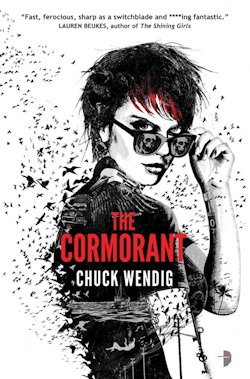
Two big ones for you today. In no particular order, let’s kick off with The Cormorant: the third volume of the Miriam Black books by Chuck Wendig, who—alongside Daniel Abraham—must be one of contemporary genre fiction’s most industrious authors.
Truth be told, I haven’t read as many of Wendig’s novels as I’ve intended to, but Blackbirds was just wonderfully wicked, and I have until the end of December to get busy with Mockingbird. Fingers crossed I can find a few moments, because The Cormorant sounds like fantastic fun:
Miriam is on the road again, having transitioned from “thief” to “killer.”
Hired by a wealthy businessman, she heads down to Florida to practice the one thing she’s good at, but in her vision she sees him die by another’s hand and on the wall written in blood is a message just for Miriam. She’s expected…
Here’s a guessing game that could be fun to play: assuming this isn’t the last we see of Miriam Black, let’s put our two pence in as to the name of the next novel. It’s got to be a bird, and have an open secret meaning. So how about… The Black Grouse?
The Cormorant’s cover art is by Joey Hi-Fi, by the by. Predictably, it’s brilliant.
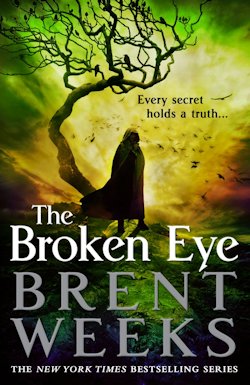
In a curious coincidence, I’m in pretty much the same place with Brent Week’s Lightbringer series as I am the Miriam Black books: I read The Black Prism when it was released and quite liked it. I very much meant to make time for The Blinding Knife, especially given its better reception, but here we are, nearly a year on from said sequel, and I’m still a book behind. Too busy putting together this column every week, clearly!
In any event, though I don’t believe a blurb has been released for The Broken Eye quite yet, last week Orbit revealed the cover art of book three of the now four-volume long Lightbringer Trilogy.
Gorgeous, isn’t it?
Which just goes to show that there’s really no problem with hooded dudes on our book covers… so long as they’re not the sole focus. Simply pose them these needful evils to something infinitely more interesting—like a pretty tree in this instance, or the Ravenheart Award-nominated staircase emblazoned upon The Blinding Knife—and it’s perfectly possible for the covers they’re on to be awesome.
Kudos to artist Silas Manhood for both illustrations. Oh, how I wish my hardcover copy of The Black Prism had his art instead of a picture of a random moustachioed man…
The Last Dark At Last
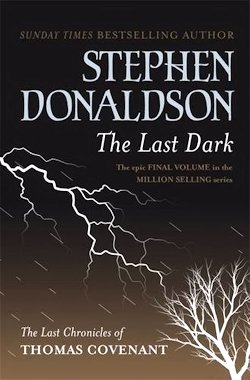
Finally for today—appropriately so, I might moot—Gollancz confirmed last week that The Last Dark will be published on the 17th of October. The Last Dark is of course the last part of The Last Chronicles of Thomas Covenant, the Unbeliever by Stephen R. Donaldson.
Compelled step by step to actions whose consequences they could neither see nor prevent, Thomas Covenant and Linden Avery have fought for what they love in the magical reality known only as ’the Land’. Now they face their final crisis. Reunited after their separate struggles, they discover in each other their true power – and yet they cannot imagine how to stop the Worm of the World’s End from unmaking Time. Nevertheless they must resist the ruin of all things, giving their last strength in the service of the world’s continuance.
This series—the third to feature the titular Unbeliever—began in 2004 with The Runes of the Earth, but the overarching narrative originated, incredibly, in 1977, with the first book of The First Chronicles of Thomas Covenant, the Unbeliever, namely Lord Foul’s Bane. Which means that readers who have been following the story from the start have spent nearly forty years with this character.
No surprise, then, that folks like Shawn Speakman, editor of the excellent epic fantasy anthology Unfettered, give The Last Dark great weight:
While reading The Sword of Shannara by Terry Brooks has had the largest impact on my overall life—after all, working with Terry has opened numerous doors that I otherwise would not have been able to walk through—no series of books have influenced me more than The Chronicles of Thomas Covenant, the Unbeliever by Stephen R. Donaldson.
I know. Those are serious words. Say what you will about Donaldson. He doesn’t shy away from doing the unbelievable. He doesn’t work hard at making the reader comfortable. He does quite the opposite, in fact. From the moment Covenant did the most horrible of acts on a girl in Lord Foul’s Bane, I knew Donaldson would polarize people. They would either love the series for the beauty of the Land and its characters or earnestly hate it for that one act.
I’ll be the first to confess that I haven’t read any of the Unbeliever books. That said, I really rather want to know what that “one act” is, now. One wonders whether it would be as shocking today as it once was…
Well, if I really fancy finding out, it’ll be much easier after the release of The Last Dark than it is at the moment. Why? Because of the other part of Gollancz’s announcement: that they’ll be making the entire saga—except, so far as I can see, the novella Gilden-Fire—available digitally for the first time ever, day and date with the publication of its conclusion.
Evidently, every end begets a beginning…
Which is such a fitting way to close out the column for today that I simply can’t resist! See you all again next Wednesday, then, for another edition of the British Genre Fiction Focus.
Niall Alexander is an extra-curricular English teacher who reads and writes about all things weird and wonderful for The Speculative Scotsman, Strange Horizons, and Tor.com. On occasion he’s been seen to tweet, twoo.










